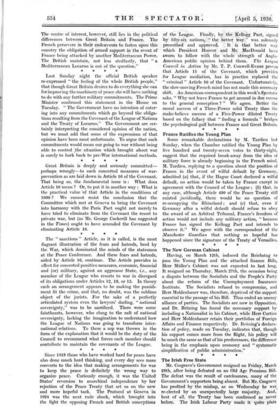Since 1918 those who have worked hard for peace have
also done much hard thinking, and every day sees more converts to the idea that making arrangements for war to keep the peace is d'efinitely the wrong way to organize peace. Curiously enough, 'it was the United States' reversion to anarchical independence by her rejection of the Peace Treaty that set us on the new and more hopeful tack. The Protocol at Geneva in 1924 was the next rude shock, which brought into the light the opposing French and British conceptions of the League. Finally, by the. Kellogg Pact, signed by fifty-six nations,- " the better way" was solemnly prescribed and approved. It is that better way which President Hoover and Mr. MacDonald have sworn to follow with the -whole strength of Anglo. American public opinion behind them. The League Council in Action by Mr. T. P. Conwell-Evans proves that Article 11 of the Covenant, which provides for League mediation, hai in practice replaced the " criminal " Article 16 of the Covenant. Unfortunately, the slow-moving French mind has not made this necessary shift. An American correspondent in this week's Spectator asks, " Why not leave France to get around in due course to the general conception ? " We agree. Better the moral success of a Three-Power solid Treaty than the make-believe success of a Five-Power diluted Treaty based on the fallacy that " finding a formula " bridges the psychological gulf between France and Great Britain.










































 Previous page
Previous page